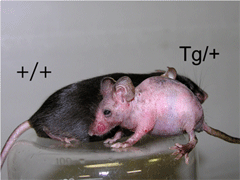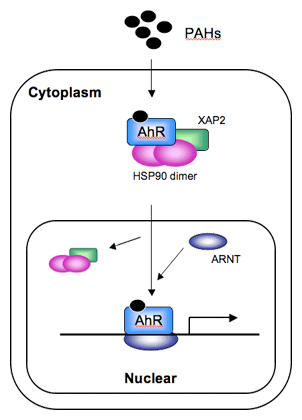 |
August 2007 Mouse of the Month |
|
K14-AhR-CA transgenic mice A model for inflammatory dermatitis
BRC No. 01597_K14-AhR-CA TG mouse line234
|
|
 BRC No. 01663 K14-AhR-CA TG mouse line239 |
 The molecular mechanism by which PAHs activate AhR-dependent gene expression (AhR: aryl hydrocarbon receptor; ARNT: AhR nuclear translocator protein; HSP90: heat shock protein 90; PAHs: polycyclic aromatic hydrocarbons; XAP2: hepatitis B virus X-associated protein 2). |
Polycyclic aromatic hydrocarbons (PAHs) are one of the most widspread organic pollutants. Occupational and environmental exposure to PAHs has been suggested to induce inflammatory disorders such as dermatitis, asthma, and rhinitis. PAHs are the ligands for aryl hydrocarbon receptor (AhR) (also called dioxin receptor), a transcription factor that mediates to catalyze xenobiotic Phase I metabolism. K14-AhR-CA transgenic mice carry a constitutive active (CA) form of mouse AhR cDNA under the control of human keratin 14 promoter. The transgenic mice are normal at birth, but develop with severe itching skin lesions postnatally. This strain is useful for the evaluation of the causal relationship between the AhR pathway and inflammatory dermatitis.
| Depositor | : | Dr. Masayuki Yamamoto (Tohoku University Graduate School of Medicine) |
| Reference | : | Mol Cell Biol 2005 Nov;25(21):9360-8. |




